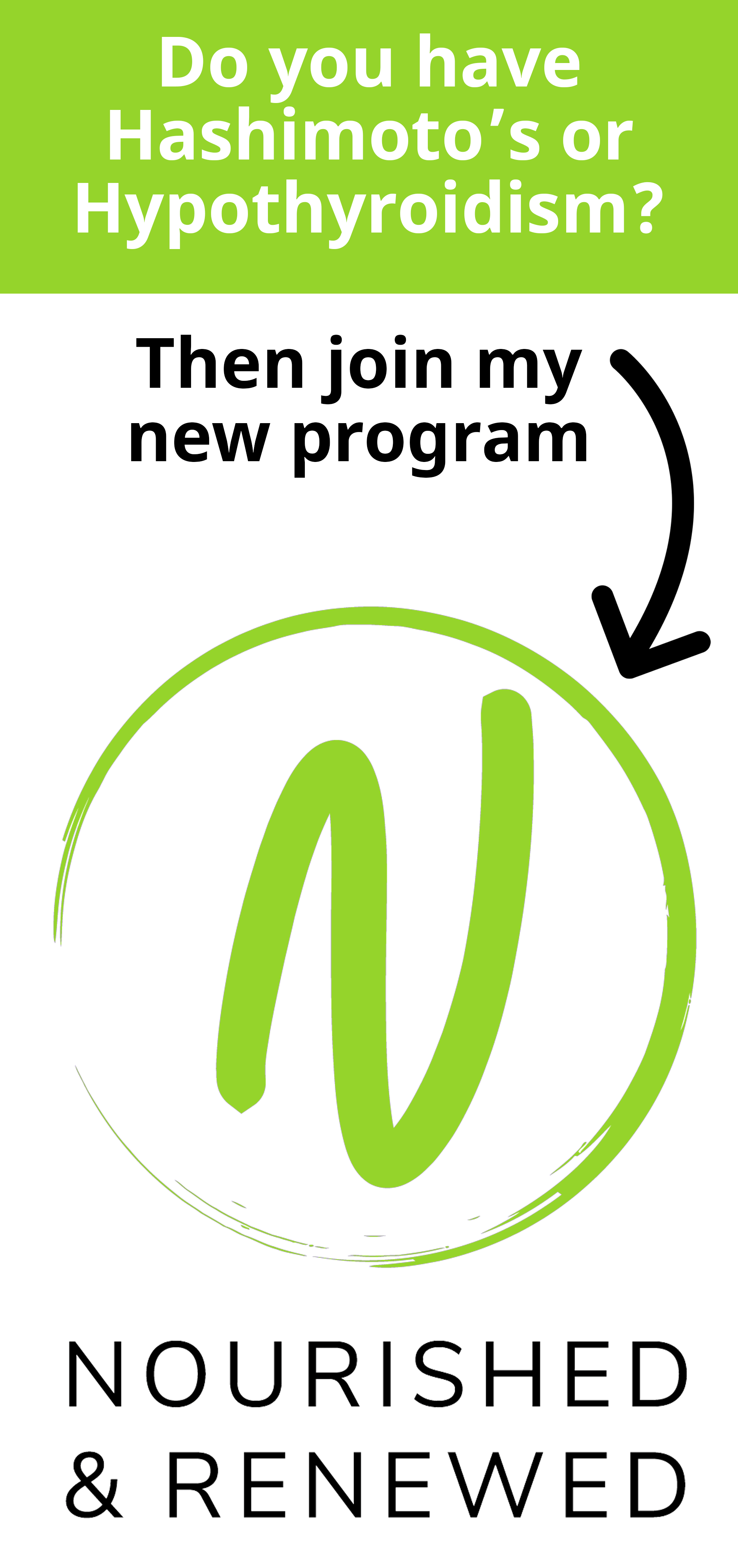Menopause makes the symptoms of Hashimoto’s worse - and vice versa. In fact, Hashimoto’s can also cause early menopause. The good news is: nutrition and lifestyle habits can help you feel better fast!
Let me share one of my clients' story.
Menopause makes Hashimoto's worse
Barb came to my office on a cool fall morning and was wearing only a light sweater.
Her cheeks were pink and there was a line of sweat across her pale forehead. She was flustered and anxious.
She fanned herself with the back of a checkbook, as she sat down in the chair. “I’m so hot today,” she declared. She was full of spunk and energy but she looked a little haggard.
“Barb” - just 45 years old - was diagnosed 20+ years ago with Hashimoto’s disease.
But, recently, her usual regimen of daily synthetic thyroid hormone replacement medication (Synthroid) was no longer working for her.
Barb said she had gained weight “seemingly overnight.” She was irritable all the time.
Her skin was drier than normal, her hair was thinning, her muscles felt weak.
Barb was riddled with worry and felt like she could no longer cope with stress.
Her sleep was terrible suddenly, and all day she felt like she was in a fog.
Her doctor had told her all her labs looked “normal.”
“It’s my thyroid,” she told me. “I think it’s acting up again.”
She assumed all her symptoms were related to her under-active thyroid, due to having Hashimoto’s disease.
Sure, that was certainly part of the story.
When I suggested we test some of her reproductive hormones to determine if she was entering menopause, she was quite surprised. “I’m too young for that…aren’t I?” she asked.
I explained that she was likely in the time leading up to menopause – PERIMENOPAUSE.

What are Perimenopause and Menopause?
As we ladies begin entering into middle age (around 39-45 years old), our bodies shift focus away from reproduction and childbearing.
And, typically, in the five to ten years leading up to menopause, most women enter perimenopause, which is when the levels of progesterone and estrogen begin to decline
A time for serious hormonal transitions.
Here’s how I like to think of it.
Perimenopause is basically the dysfunctional aging relationship between the brain and the ovaries.
The ovaries are literally deteriorating (I know, awkward) due to the cessation of ovulation.
While the ovaries begin their decline, the brain hasn’t caught up yet to realize they do not maintain the same hormonal activity as they have for many years.
Perimenopause & Menopause Symptoms:
- Worsening of PMS symptoms before or during the menstrual period
- Abnormal vaginal bleeding or “spotting” between periods
- Missed periods, longer menstrual cycles, or shorter menstrual cycles
- Heavier periods, blood clots, menstrual pain
- Ovulation pain at mid-cycle
- Vaginal dryness, thinning of vaginal tissue
- Hot flashes, chills
- Difficulty sleeping
- Decreased libido
- Anxiety, depression
- Brain fog, forgetfulness
- Weight gain, especially around the abdomen
- Headaches, migraines

Menopause: Estrogen’s Relationship to Progesterone
Between the time perimenopause starts through about age 50, there is an approximate 35% drop in estrogen, with a 75% reduction in progesterone occurring simultaneously.
That’s a lot of hormones dropping. All. At. Once.
But, not to worry.
This is considered normal, because estrogen and progesterone are so dependent on each other.
They fall together.
Because progesterone decreases at a greater rate than estrogen, women end up with symptoms of estrogen dominance, even if estrogen levels are lower than before.
This time of perimenopause is defined not by the absolute overabundance or deficiency of estrogen or progesterone.

copyright Energeticnutrition.com
Therefore, perimenopause is defined by the relative amount of estrogen and progesterone when compared to each other.
If progesterone is out of balance relative to estrogen, estrogen dominance is at work.
Estrogen Dominance Symptoms:
- Allergies, asthma, hives
- Bloating
- Breast tenderness
- Increased risk of breast cancer
- Cold hands or feet
- Dry eyes
- Enhanced symptoms of PMS
- Faster aging process
- Fatigue
- Hair loss
- Headache
- Increased risk or incidence of autoimmune conditions (including Hashimoto’s thyroiditis)
- Irregular menstrual periods
- Low libido
- Mood swings
- Sinus congestion
- Thyroid dysfunction
- Trouble sleeping
- Weight gain
How are Menopause and Hashimoto’s Related?
I hate to break this to you.
Menopause makes the symptoms of Hashimoto’s worse - and vice versa.
Hashimoto’s can in fact also cause early menopause.
That’s right.
Having Hashimoto’s can actually lead to earlier than planned ovarian deterioration and hormonal cessation.
Sometimes, it is during perimenopause or menopause when a woman discovers that she also has Hashimoto’s.
Hashimoto’s Symptoms:
- Anxiety, depression
- Brain fog, forgetfulness
- Weight gain, especially around the abdomen
- Difficulty regulating body temperature, feeling cold
- Decreased muscle mass
- Increased stress
- Decreased physical stamina
- Overwhelming fatigue
- Muscle & joint aches & pains
- Mood changes/irritability
- Difficulty sleeping
- Decreased libido
See the similarities between Estrogen Dominance, Hashimoto’s and Peri- and Menopause?
There is a lot of crossover, and this largely has to do with the fluctuation of so many hormones.
No doubt, it can be confusing.
It’s important to be working with a practitioner or nutritionist who can help you navigate this challenging time.
I see a lot of women in my practice who think they are in menopause, only to discover they are also actually in the early stages of Hashimoto’s!
Link between estrogen dominance, thyroxine-binding globulin and Hashimoto's
I also see a lot of women in my practice who have Hashimoto’s (like Barb).
When they go through peri- or menopause, they find their Hashimoto’s feels much worse than before the hormonal change.
That is because the thyroid hormones and sex hormones are intricately connected.
The Journal of Thyroid Research studied the effects of estrogen on another important hormone: thyroxine-binding globulin (TBG).
TBG is a type of globulin (protein) produced in the liver. TBG is a circulating protein.
The research showed that excess estrogen may increase TBG.
Who cares?
This is what matters: TBG binds to thyroid hormones T3 and T4, and carries them into the bloodstream, making them less available to the body’s needs.
Estrogen Dominance → Excess TBG → Less T3 and T4 → Hypothyroidism
A research study from 2007 showed that women with a thyroid disorder and severe menopause experienced improved symptoms after getting treated for the thyroid disorder.
This suggests that improving thyroid function – whether through medication or natural means – can help manage perimenopause and menopause symptoms.
Testing for Menopause & Underactive Thyroid
It’s important to test for - and know - your hormone levels.
For many reasons, I recommend a work up of these tests early on in your 40s, so you have a baseline of what levels are normal for you before symptoms of menopause arise.
If you have Hashimoto’s disease, I recommend being seen regularly by a practitioner who tracks your thyroid levels and manages any medication you are taking.

Both menopause and Hashimoto’s can be diagnosed with simple blood tests that check levels of the following values:
High levels of follicle stimulating hormone (FSH)
FSH is the hormone responsible for maturation and ovulation of an egg in the ovary. As a woman ages, her body needs more FSH to do this.
Persistently raised levels of FSH (over 30 milli-international units per milliliter (mIU/mL)) can indicate menopause.
Increased Luteinizing hormone (LH) after menopause
LH is also persistently raised after menopause.
A woman will have more LH in the middle part of her menstrual cycle because the release of LH is what triggers ovulation.
So, a single elevated value will not definitively diagnose menopause.
Thyroid stimulating hormone (TSH)
Checking the levels of TSH is often the first (and sometimes only) test that doctors will use to see how the thyroid gland is working.
When the thyroid is not working correctly, the pituitary produces TSH to stimulate the thyroid into producing thyroid hormones.
A high TSH level can indicate an under-active thyroid.
T3 and T4
These are the two main hormones that the thyroid gland produces.
Levels do not change significantly with an underactive thyroid, but some doctors carry out the test to rule out other thyroid conditions.
Testing for the Free T3 and Free T4 can be helpful in understanding how much of the active hormone is available for use in the body.
Thyroid antibody testing for Hashimoto's thyroiditis
The thyroid gland contains cell proteins, and sometimes the body produces antibodies against these proteins.
If this happens, it can cause both underactive and overactive thyroid disease.
Testing For Sex Hormone Binding Globulin (SHBG)
Sex hormone binding globulin is a carrier protein produced by the liver. It plays a critical role in regulating the amount of the unbound steroids, testosterone, dihydrotestosterone (DHT) and estrogen in the blood.
SHBG carries these hormones throughout your bloodstream - therefore, hormones in this bound state aren’t available for your cells to use.
Generally speaking, when your SHBG levels are low, your body has more hormones circulating (including estrogen).
When your SHBG levels are high, your body has fewer hormones at its disposal (including progesterone).
Women with Hashimoto’s tend to have lower levels of SHBG, which can lead to an excess of estrogen, or estrogen dominance indicating hypothyroidism..
Less SHBG → Excess estrogen → Excess TBG → Less T3 and T4 → Hypothyroidism
This is the standardized set of tests commonly ordered by doctors to assess hormones and to even diagnose hypothyroidism.

Saliva Hormone Tests
OK, I admit I am biased here.
Saliva testing is the type of hormone testing I use in my office.
Saliva testing is an easy and noninvasive way of assessing your hormone balancing needs, and is proving to be the most reliable medium for measuring hormone levels.
Unfortunately, right now, most doctors do not understand saliva hormone testing, nor do they offer it in their offices.
So, finding a practitioner who uses saliva hormone testing and can reliably interpret the results is important and critical to your total hormone health picture.
Why Is Saliva Testing Better?
Well, unlike serum tests, saliva testing represents only the hormones which can be actively delivered to receptors in the body.
Clinically, saliva testing is far more relevant to test these bioavailable hormones and provide an accurate reflection of the body’s active hormone levels.
Serum tests (like mentioned above) only show the snapshot of what is free plus bound hormones circulating in the body.
However, it does not tell what amount of hormone can actually be used by hormone receptor sites.
Natural Treatments for Hashimoto’s & Menopause
First of all, it’s important to know that food and lifestyle practices can lower anti-thyroid antibodies.
And, especially for any woman with Hashimoto’s in the Peri- or Menopause stage, anything you can do naturally to lower antibodies is particularly important.
Because estrogen dominance, Hashimoto’s and Peri- and Menopause have so many similar symptoms, addressing hormonal balance in general, is often the best approach to feeling better.

EXERCISE to maintain a healthy weight even if you have Hashimoto's
Regular exercise can do a lot for a woman’s health in general.
Boosting mood, energy, outlook and even regulating sleep are known positive side effects of a regular exercise routine.
For Hashimoto’s, exercise helps to maintain a healthy weight, builds muscle to help strengthen metabolism and produces sweat which is a great detox pathway.
For women in menopause, exercise can help to deter hot flashes, which can improve a woman’s overall comfort and happiness.
My women clients who work out regularly tell me that they have relatively few symptoms of menopause.
STRESS MANAGEMENT to minimize the stress on adrenals and immune system
Some women may find menopause and Hashimoto’s symptom relief through utilizing a toolbox of stress reduction techniques.
Reducing stress is important during perimenopause and menopause for reducing the burden on the adrenal glands and immune system.
A body in balance copes with stressful day-to-day issues much better than a body in fight or flight mode.
Techniques such as meditation, visualization abdominal breathing, journaling, self-care, regular massage therapy or other personal choices are excellent for helping to calm the nerves.
For managing my Hashimoto’s, I personally have relied on a strict but nurturing self-care routine before bedtime.
Epsom salt baths, regular stretching, journaling, reading, essential oils like lavender on my diffuser, and lights out by 10 pm has been my regimen for nearly two decades.
SLEEP to balance your hormones
No matter how nutritious your diet is and how much exercise you get, your health will suffer if you don't get enough restorative sleep.
Poor sleep has been linked to imbalances of many hormones, including insulin, cortisol, leptin, ghrelin and growth hormone.
To maintain optimal hormonal balance, aim for at least seven hours of high-quality sleep per night.
A darkened, cool, quiet room - with no blue light from screens or technology - is the best sleeping environment.
Going to bed at the same time each night also helps to stabilize circadian rhythms, and promotes more restful sleep.
NUTRITION for women with both Hashimoto's disease and menopause
These tips are relatively generic for women with Hashimoto’s who are going through perimenopause or menopause.
The best recommendations are the ones that are specially suited to you - based on your food and lifestyle preferences, goals, habits and vision for optimal health.
Coffee increases estrogen levels.
Let’s start with coffee. Coffee is my favorite and I would never dream of taking away your morning cup of love.
But, I do feel obligated to tell you that caffeine is hard on your adrenal glands.
Coffee increases your adrenal output of cortisol and adrenaline.
Both of them are stress hormones and may over time increase abdominal fat, and further upset your hormone balance.
In this way, caffeine increases estrogen because abdominal fat aromatizes estrogen - meaning it makes its own estrogen, like another hormone gland in the body all on its own.
Coffee is not great for hormone balance, proper weight management, healthy body composition, or optimal health.
Try to limit yourself to just one cup of organic, regular coffee per day.
Use coconut milk or almond milk and avoid adding sweeteners in your coffee.
Reduce menopause symptoms with tea
I do suggest trying some new morning beverages - especially if you are thinking about cutting down on coffee.
For example, green tea is especially rich in antioxidants.
Women who drink green tea feel fewer effects of aging, including improved cognition and memory.
They have a lower risk for certain types of cancer, and may experience an overall reduction in menopause symptoms.
Other herbal teas are excellent for their health-promoting properties. I love Rooibos tea, which is caffeine-free, and naturally energizing.
Control your sweets intake to manage your blood sugar and insulin level
Sugar/sweets/refined carbohydrates are another treat which should be consumed in moderation.
There are so many ways in which sugar definitely affects women’s hormone balance. But, for some people, I get it - cutting out all sugar feels next to impossible.
Consider this: simple, refined sugars cause spikes in blood sugar and insulin.
On the other hand, complex carbohydrates, fiber, protein and healthy fats promote more gradual fluctuations in blood sugar and insulin.
This lowers the body’s sugar totals, and lifts the burden on your hormones.
If you are going to have a sweet treat, make a homemade recipe sweetened with dates, molasses, raw honey, pure maple syrup or fruit.
Those sweets will mess less with your hormones and still satisfy a sweet tooth.
Dairy Products from Cow’s Milk can cause weight gain
Dairy milk promotes excess estrogen in the body due to it containing the endogenous (internally-made) estrogen from female cows.
At the same time, milk naturally contains androgenic properties, so it raises testosterone in the body and can cause weight gain quickly.
Milk and milk products from conventional dairy cows are absolutely chock-full of all hormones we don’t need.
On top of it, milk from pregnant cows (which is how all milk products are produced) contains about 33 times as much estrogen as milk from non-pregnant cows.
Ewww.
So, honestly, if you are want to have balanced hormones, better thyroid health, and an easy menopause transition, ditching dairy is one of the best food changes you can make.
Clean Protein to produce important body molecules
Our bodies need enough protein to produce important molecules in our body – enzymes, hormones, neurotransmitters, and antibodies.
Without adequate protein intake, our bodies can’t function well at all.
Consuming protein can also increase levels of the hormone glucagon. Glucagon can help to control body fat.
So, consuming clean protein - like from grassfed, pasture-raised and organic, humanely-raised farmers and ranchers - is helpful for healing thyroid tissue.
And they also help in building and maintaining lean mass and balancing hormones.
Veggies to keep your hormones in balance
All vegetables (but especially green leafy vegetables) are healthy dietary sources of most vitamins and minerals.
Every day, make an effort to include broccoli, Brussels sprouts, collards, kale, mustard greens Swiss chard, spinach.
For these types of cruciferous veggies, be sure always to lightly steam or cook them to protect the thyroid.
But, definitely do not avoid them if you have Hashimoto’s.
Other vegetables to focus on are all brightly colored, nutrient-dense, fresh, and organic vegetables.
Plant foods contribute so much to our overall health.
It also provide sufficient fiber and low-sugar (also called “complex”) carbohydrates to help keep our hormones in balance.

Anti-Inflammatory Foods
For my Hashimoto’s clients, I often recommend an anti-inflammatory food plan (with any modifications based on unique food sensitivities).
It focuses on organic, antioxidant-rich fruits and vegetables, pastured and grass-fed poultry and beef, wild-caught salmon and healthy fats such as extra virgin olive oil, coconut oil, avocado, Ghee and some nuts/seeds.
Anti-inflammatory culinary herbs and spices include: ginger, garlic, turmeric, rosemary and basil.
Typically, gluten-free food plans have the lowest inflammatory response in the body.
So, a low- or no-gluten plan is also advised for both Hashimoto’s and hormone balance at the time of menopause.
All foods listed here provide a solid foundation for the best health possible.
To get the most positive effect from these food, customization to your own unique circumstances is highly recommended.
SUPPLEMENTS for Hashimoto's and menopause
Many of these supplements are also suitable for Hashimoto's, even if you are not in the menopause phase of life yet. Proper nutrition is especially important for the postpartum period.
**(Links below will take you to FullScript, if you have an account).
B complex To Boost Hormone Production
B vitamins participate in a large number of functions, and one of them is the production of hormones.
For example, B3 and folic acid are needed to produce estrogen.
When going through menopause, the ovaries are gradually stopping the production of sex hormones, and it is the adrenal glands and fat cells that will continue to produce them.
The conversion and production of hormones from the adrenal glands depends largely on B vitamins, especially B5 (pantothenic acid).
I suggest Vital Nutrients B-Complex.
Magnesium To Support Your Body Systems
Here is a true miracle-worker for your health and hormones - magnesium!
This mineral is the fourth most abundant mineral in our body.
And it’s needed for literally hundreds of different chemical processes.
So it’s very, very, very important.
Here are just a few of the thousands of processes and systems in the body supported by magnesium:
- keep your bones healthy
- proper nerve function
- mood boosting
- good muscle function
- heart health
- thyroid balanced
- regulate calcium
- produce hormones especially during menopause
- supports natural restfulness and sleep
- regulate blood pressure
- healthy hair and nails
And that is just the start!
I suggest Klaire Labs Magnesium Glycinate Complex.
Adrenal Support Herbs To Reduce Stress
I believe that in this stage of life (more than any other), supportive and gentle adaptogenic herbal formulas (including Ashwagandha, Rhodiola and Holy Basil) can be of great help to reduce stress.
They can also help improve sleep, regulate hormone production, protect the hard-working adrenal glands and boost energy where needed.
I suggest Vital Nutrients Adrenal Support.
Zinc Supports the Immune System
Zinc is first a mineral but it is also a powerful antioxidant.
It is commonly used for the common cold because it supports the immune system.
It can also be taken to heal gastroenteritis or digestive distress, like from food poisoning, and to resolve issues of gut permeability (leaky gut).
Zinc is responsible for producing enzymes that are crucial for making new DNA, cell replication and healthy hormone function.
Research has shown that women taking hormone replacement therapy have improved zinc levels compared to perimenopausal, menopausal, and postmenopausal women not taking hormone replacement therapy.
There is something about the presence of estrogen in females that helps the body retain zinc and not eliminate zinc from the body.
The presence of balanced estrogen actually helps the body retain zinc.
On the other side of the coin, studies have also found that zinc supplementation can increase the serum level of sex hormones in the body.
And that can mean a reduction in menopause symptoms.
I suggest Progressive Laboratories Zinc Picolinate.
Vitamin D3 to Boost Mood and Improve Cognitive Performance
Vitamin D is a wonder-vitamin because it plays a central role in SO many body processes.
I put Vitamin D on the A-list for women during menopause.
Studies have linked Vitamin D to preventing heart disease, osteoporosis, diabetes, cancer, and weight gain.
Unfortunately, as many as half of adults are deficient in vitamin D and are therefore not receiving the benefits.
Here’s a big reason why it’s important: Vitamin D has been shown to have a positive effect on boosting mood and improving cognitive performance.
Since low mood or depressive symptoms are common in the menopause years, Vitamin D can bring great relief.
So, if have Hashimoto’s and are in your 40s, you may want to boost your vitamin D intake during those darker months.
I suggest Quicksilver Scientific Nanoemulsified D3K2.
Essential Fatty Acids Helps to Balance Your Hormones
I suggest adding ground flax seeds and/or flax oil to your daily food plan.
Just 1-2 tablespoons per day can increase the levels of Sex Hormone Binding Globulin (SHBG) *discussed in testing above* which can help in balancing hormones.
Additionally, flax may have positive estrogen-like effects because of the lignans (also called phytoestrogens) they contain.
Note: Phytoestrogens are a natural compound found in plants and plant-based foods. When eaten, they may affect a person in a similar way as estrogen produced by the body.
I also suggest Genestra’s Organic Flaxseed Oil Capsules.
Hashimoto's and Menopause Can Exist Harmoniously
So, back to Barb.
Her saliva hormone tests showed that she was indeed low in estrogen, progesterone and cortisol (her cortisol levels are another story for another day).
Her endocrinologist ran a thyroid panel showing that she was low in Free T3.
My client, Barb, was in fact at the intersection of perimenopause, and her Hashimoto’s disease had caused an increase in symptoms at her still-young 45 years old.
Not at all uncommon in a Hashimoto’s client.
Since Barb was already following my Hashimoto’s food plan, we focused our efforts on fine-tuning herbs, supplements and lifestyle measures to help boost her reproductive hormones.
Within a few months, Barb’s hot flashes had greatly subsided - a primary symptom she needed to improve for better quality of life.
Other symptoms which resolved and gave her great happiness were: increased libido, better quality sleep, less brain fog, and more energy for exercise a few times per week.
Hashimoto's disease affects a woman's energy at different life stages
As a woman with Hashimoto’s, I am well aware of how Hashimoto's affects the energy of a woman in different life phases.
Unfortunately, I know all too well the effects of Hashimoto’s on hormones (and imbalances) at various times.
I have gone through just about all of it - from diagnosis in my 20s, to how it affected me post-pregnancy in my 30s. And of course, how Hashimoto’s was responsible for our pregnancy losses while trying to start our family.
Next up for me will be my own transition in to perimenopause and menopause. I am definitely thinking about how to keep my hormones on track.
If you need some guidance during this phase of your life, let’s talk.













